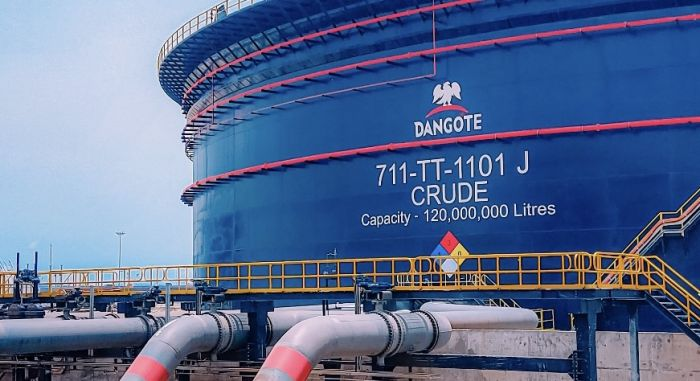In a significant development within Nigeria’s energy sector, the Dangote Refinery has been identified as the country’s only active producer of Premium Motor Spirit (PMS), commonly known as petrol. This revelation comes from energy analyst Kelvin Emmanuel, who highlighted the refinery’s pivotal role in meeting Nigeria’s fuel demands.
According to Emmanuel, the Dangote Refinery currently produces approximately 44 million liters of PMS daily, positioning it as the primary source of domestically refined petrol in Nigeria. In contrast, the Nigerian National Petroleum Company Limited (NNPCL) is reported to be engaged solely in blending operations rather than actual refining. This distinction underscores the Dangote Refinery’s unique status in the nation’s fuel production landscape.
The Dangote Refinery, inaugurated in May 2023, is designed to process up to 650,000 barrels of crude oil per day, making it the largest single-train refinery globally. Its establishment aims to reduce Nigeria’s dependence on imported refined petroleum products, a goal that has become increasingly critical given the country’s historical reliance on fuel imports despite being a major crude oil producer.
The NNPCL’s current focus on blending, rather than refining, has raised concerns about the efficiency and self-sufficiency of Nigeria’s fuel supply chain. Blending involves mixing imported refined products to meet specific standards, which does not contribute to building domestic refining capacity. This situation has prompted calls for increased investment in refining infrastructure and a reevaluation of the roles of public and private entities in the sector.
The Dangote Refinery’s operational status not only signifies a milestone in Nigeria’s industrial capabilities but also presents an opportunity to address longstanding challenges in the energy sector. By producing petrol domestically, the refinery has the potential to stabilize fuel prices, improve energy security, and stimulate economic growth through job creation and related industries.
However, the success of this venture depends on several factors, including consistent crude oil supply, regulatory support, and the resolution of any logistical or operational challenges. Ensuring that the refinery operates at optimal capacity will be crucial in realizing its full benefits for the Nigerian economy and its citizens.
In conclusion, the Dangote Refinery’s emergence as Nigeria’s sole petrol producer marks a significant shift in the country’s energy dynamics. As the NNPCL continues its blending operations, the focus now turns to how Nigeria can leverage this development to achieve greater energy independence and economic resilience.








